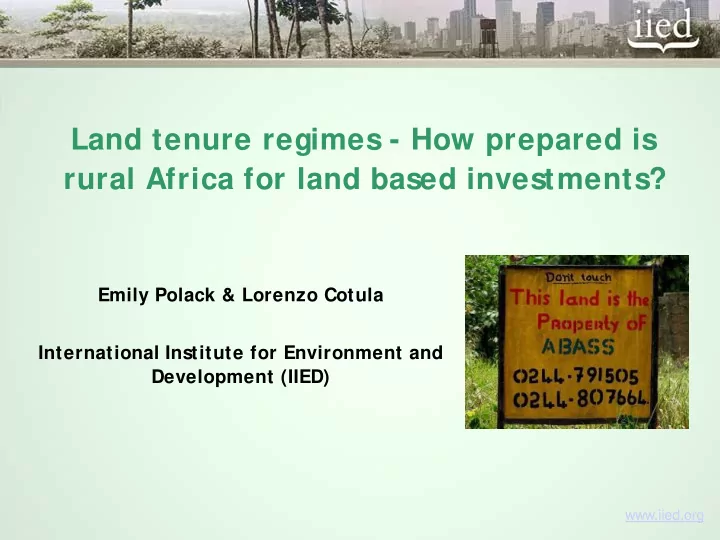

Land tenure regimes - How prepared is rural Africa for land based investments? Emily Polack & Lorenzo Cotula International Institute for Environment and Development (IIED) www.iied.org
To what extent and how do prevailing land tenure regimes secure local land access in the face of increasing land-based investments?
Land tenure – definitions and rationale Land tenure regimes refer to the systems of rights, rules, institutions and processes under which land is held, used, managed and transacted Land tenure may be ‘ secure’ or ‘ insecure’ ; Formal systems may not necessarily be more secure than informal ones S ecure land access = Confidence that land users will not be arbitrarily deprived of rights they enj oy over land or the benefits they derive from it Legal or general social recognition; enforcement mechanisms; social and / or legal sanctions against those who break the rules S ecure land access offers social safety net for subsistence production or income generation and creates incentives for investment in agriculture (new varieties, capital works, irrigation, conservation) or pastoralism
Case studies e.g. Mozambique, Tanzania, Mali... Progressive laws – recognising local rights to land, customary and collective rights Clear indications that processes of land acquisitions by national or foreign investments are not showing these laws to have teeth in this emerging context, and land tenure is far from secure
Analysing tenure security Assessing both substantive and procedural rights – as they influence negotiating power and position of local landholders vis a vis other interests. Assessing level of recognition and legal protection of land access for particular land holders (what rights do local land holders and land users have? – women, pastoralists, sharecroppers) Assessing process such as ES IAs, consultations, transparency, redress
Key messages for donors Longstanding work on land tenure (2004 guidelines - still a reference point) Context is changing and fast – requires new thinking What is needed? S trengthening government systems for fulfilling procedural and substantive rights – e.g. systems for consultation and compensation
Recommend
More recommend